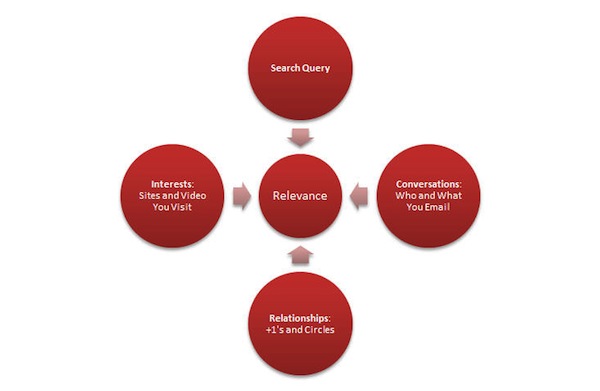Aggregating consumer data for marketing is not a new idea. Direct marketers have been doing it for years, appending information to lists from a variety of sources, like warranty cards. Google’s new privacy policy, which generated some negative reactions from users and lawmakers, plainly explains that the data they append to user records from product usage across the suite of Google sites will change the search results experience:
If you’re signed into Google, we can do things like suggest search queries – or tailor your search results – based on the interests you’ve expressed in Google +, Gmail, and YouTube. We’ll better understand which version of Pink or Jaguar you’re searching for and get you those results faster.
Last year, I talked about how social media affects paid search before Google + was revealed and the dawn of paid search without keywords.
Google’s privacy policy revisions and the continued expansion of Google + are part of a nascent, but important, trend in paid search: targeting ads to people, not just search queries.
Relevance: What You Do and Who You Are
Ads are just answers say both Google and, before them, the ClickEquations Blog. If you’re searching for “blue kitchenaid professional mixer”, your intent is obvious and advertisers just have to get in front of you as efficiently as possible. Relevance is very straight forward:

But what if you’re searching for “men’s watches” or “broadway show”? The intent is vague. Google’s task is to:
- Decipher the ambiguous intent
- Serve a relevant ad
- Create an advertisement that is compelling enough to click
When what you say, the search query you type, isn’t clear enough to accomplish all of those things, what you do and who you are can fill in the gaps to be more relevant:

Google never explicitly asks you who you are or what you like, but they have spent years giving away access to compelling sites like YouTube, Gmail and now Google+, not to mention Google’s search engine.
The usage of these sites, combined with data aggregated from third parties, can enhance relevance by appending interests and relationships to your profiles.
Interests
Google has slowly expanded into leveraging its network of AdSense partner sites to create behavioral based profiles of users:
“When a user visits an AdSense partner website, we analyze the content of the page and site to show contextually relevant ads. We use these page topics as well as data from third-party companies to associate interests with a user’s cookie, taking into account how often users visit sites of those categories, among other factors.
Google may use the websites a user visits, as well as third-party data, to infer the user’s gender, age category, and other demographics. For example, if the sites that you visit have a majority of female visitors (based on aggregated survey data on site visitation), we may associate your cookie with the female demographic category.”
Conversations
Text analysis has always been at the core of how Google tries to pair text ads to queries and how it determines which ads could potentially be relevant on an AdSense participating publisher on the Display Network.
Earlier this year, Google started personalizing ads based on email that you read:
“For example, if you’ve recently read a lot of messages about cameras, maybe you’d like to see an offer from your local camera shop. On the other hand, if you’ve reported these messages as spam, or marked them ‘not important’ you might not want to see that offer. Soon, some of you will start seeing fewer ads overall, and focused on subjects we hope will be important to you, at the right time.”
Relationships
Word of mouth has always been the most powerful form of advertising. If the people you know and trust do or recommend something, you’re much more likely to pay attention and engage.
Sociographics provide a powerful trigger for relevance by allowing Google to prioritize advertisers or pages recommended not just by other people, but by people you know and trust. Those relationships are based on who you’re connected to (Google +, Gmail, etc.) and what they recommend (+1).
Google’s Search, Plus Your World is the most dramatic integration of social yet. It’s only going to speed the adoption of +1, which is already a part of AdWords on the search and display networks.

He Who Controls the Data Wins
The benefits to Google of this approach are obvious. The more relevant the ads, the more satisfied users, the more clicks on ads and the higher the effective CPM of their search results.
The immediate implication for paid search advertisers in the short term is a renewed sense of urgency to incorporate social proof, in the form of social extensions, into your advertising and to bolster those extensions by encouraging +1’s
The longer term implications are vaguer, but I’m going to make some predictions. I think the future of paid search is being played out on the Display Network right now.
Display (formerly the Content Network) used to be like search: keyword driven to match advertisers with potential customers.
Today, the display network is much more about interests, retargeting and managed placement buys. It is about audiences, regardless of where they are or what they’re looking at. This is appealing for Google for a variety of reasons, not the least of which is that it allows them to monetize inventory with broader targeting, or what I described in my article about paid search without keywords as being “subtraction, rather than addition.”
The Display Network has changed from its origins of direct response and evolved into tool that complements brand advertisers’ traditional ways of buying media around target audiences.
As Google aggregates more data about whom users are, what they do and, with the continued expansion of Google +, what and who they like, they are creating a vastly useful store of data. It’s only a matter of time before that data and search collide.


